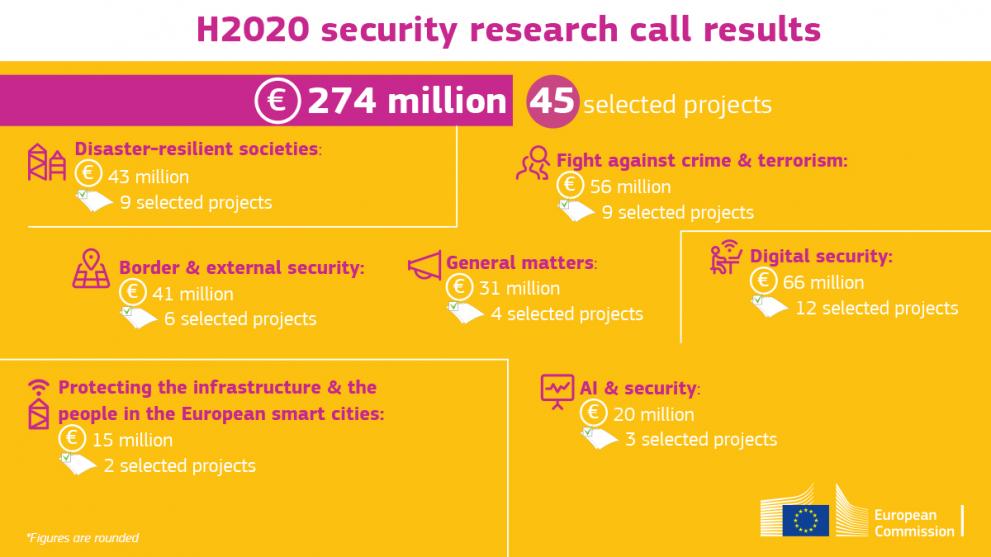The new projects will receive almost €274 million EU funding to work on artificial intelligence and security, protecting the infrastructures of Europe, increasing the disaster resilience of societies, fighting crime and terrorism, securing external borders, as well as improving digital security and data protection.

The over €270 million come from Horizon 2020, the EU’s €80 billion research and innovation programme. The EU's financial contribution is made in the form of grants that can represent up to 100% of the project’s total budget.
Examples of projects that have been selected are the following:
LAW GAME is a project that aims to train police officers through gamification technologies in a safe and controlled virtual environment. The project will contribute to the development of core competencies required to perform intelligence analysis, through a series of AI-assisted procedures to analyze crimes and predict illegal acts, within the scope of the LAW-GAME game. Building upon an in-depth analysis of the learning needs of police officers, the project will bestow an advanced learning experience.
STARLIGHT presents an inclusive and sustainable vision for increasing the awareness, capability, adoption and long-term impact of Artificial Intelligence (AI) for Law Enforcement Agencies (LEAs) in Europe. STARLIGHT intends to enhance the widespread understanding of AI across LEAs in order to reinforce their operations and provide opportunities for LEAs to exploit AI tools and solutions in their operational work. Further, STARLIGHT aims to ensure that LEAs can protect their own AI systems through privacy- and security-by-design approaches, better cybersecurity tools and knowledge, while at the same time it will raise LEAs’ expertise and capacity to combat the misuse of AI-supported crime and terrorism as well as to boost the EU’s strategic autonomy in AI.
VALKYRIES will develop, integrate and demonstrate capabilities for enabling immediate and coordinated emergency response including search and rescue, security and health, in scenarios of natural/provoked catastrophes with multiple victims, with special application in cases in which several regions or countries are affected and hence greater interoperability being required. -VALKYRIES will propose both design and development of a modular, interoperable, scalable and secure platform, which will allow the integration between legacy solutions and new technologies.
The global aim of PREVENT PCP is to augment the security in public transport through innovative procurement of technology solutions. The proposed technologies will endow Public Transport Operators with solutions enhancing security situational awareness through: Timely automatic detection of potentially dangerous unattended items in Public Transport Infrastructure and in public areas in the vicinity; Identification and tracking of perpetrators; and advanced crisis management system.
HoloZcan brings a new tool for security actors notably in the fields of autonomous detection and response capabilities. The project will increase (environmental and exhaled) bio-aerosol sensing/measurement capability of chemical, biological, radiological and nuclear (CBRN) practitioners by developing a high resolution, large throughput, automatic and highly portable detection system for making automatic classification of pathogens and particles. HoloZcan develops of a novel holographic microscopy and imaging technology for rapid and cost-efficient screening of potential biological threats and unknown, potentially dangerous substances, combined with methods of artificial intelligence and machine learning.
The core vision of pop AI is to build trust in Artificial Intelligence (AI) in the security domain. It will do so via increased awareness, continuous social engagement, consolidation of different spheres of knowledge (including both theoretical and empirical by academics and non-academics) and offering a unified European view across LEAs, and results of specialised knowledge (recommendations, roadmaps, etc). At the same time, an ecosystem will be created to serve as the structural basis for a European hub for sustainable and inclusive AI for law enforcement.
The SPATIAL project seeks to address the challenges of black-box AI and data management in cybersecurity by designing and developing resilient accountable metrics, privacy-preserving methods, verification tools and system framework that will serve as critical building blocks to achieve trustworthy AI in security solutions.
How were the projects selected?
All projects were selected via four competitive calls for proposals launched on 12 March 2020:
- Protecting the infrastructure of Europe and the people in the European smart cities
- Security
- Digital security
- Artificial Intelligence and security
Five-hundred-eleven project applications were received by the call deadline (27 August 2020) and accounted for a total request of nearly €1.6 billion of EU funding
The selected projects received the highest marks in a peer evaluation run by the European Research Executive Agency (REA) with the help of external experts.
Next steps
REA has finalised the preparation and signature of grant agreements with beneficiaries. Most projects are starting between May and October 2021 and will run for two to five years. REA will manage all the selected projects, in collaboration with DG HOME and DG CNECT regarding the policy-related aspects.
Background documents
Horizon 2020 – Secure societies – protecting freedom and security of Europe and its citizens
Details
- Publication date
- 17 May 2021
- Author
- European Research Executive Agency
